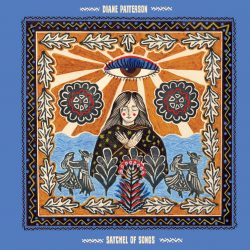A compelling, accomplished addition to uncompromising musical activism.
 It’s fair to say that some albums or bands which proudly wear a beating heart of activism on their sleeves like Diane Patterson’s ‘Satchel of Songs‘ sometimes risk being excessively earnest and/or patronising and/or superficial. (Take a bow, U2).
It’s fair to say that some albums or bands which proudly wear a beating heart of activism on their sleeves like Diane Patterson’s ‘Satchel of Songs‘ sometimes risk being excessively earnest and/or patronising and/or superficial. (Take a bow, U2).
However, ‘Satchel of Songs’, the US artist’s sixth solo LP and described by Patterson as ‘mystic-acoustic-Americana’ and ‘love as revolution’ avoids such minefields, mainly by combining deeply unpredictable but original outlooks on her various causes and other material with some stunning singing, highly accessible lyrics and last but not least, 10 tracks worth of very deftly produced folk and folk rock.
But boy, are those perspectives unpredictable, ranging as they do from (wait for it) 13th century mystic Persian poetry to Viking poetry to anti-pipeline water protestors being lent a hand by a herd of buffalo. Not to mention shamanic chanting of sacred American recipes. In Spanish. Yet for all that sounds a mite weird and over ambitious, the net result on ‘Satchel of Songs’ is actually very stimulating and engaging. (It’s also a bit of a brain stretch to review, to be honest, but that’s probably partly the point.)
It certainly helps in assimilating all this material that the first song on ‘Satchel of Songs‘, ‘Roots Heart Rhythm’ acts as a fairly soothing scene-setter. Its chilled reggae beat and relaxed tone both allows Patterson to set out her stall – a strongly spiritual, naturalistic perspective on life would perhaps be the best description – and simultaneously describes the holistic intertwining links she perceives between music, the outside world and emotions.
Where the album gains in deeply personal traction, though is through those seriously unusual points of view, of which track two ‘Silk and Honest Pay’, is probably the prime example. The kernel of the song, a single extant line of a long-lost Viking poem, “Last night I dreamed of silk and honest pay” is reconstructed as a celebration of the transformative power of nature, music, dance and the imagination. At the other end of the spectrum, the title track, ‘Satchel of Songs’, directly expresses Patterson’s regret for the damage done to the indigenous Sami culture and people in Sweden by the country’s ruling establishment. There’s yet another switch of perspectives on a song like ‘Steady the Hand’ which tries to give insight and hope to psyches wrecked by war and violence in Aleppo, Syria through the power of prayer. As for ‘Standing Rock’, it’s a moving, straightforwardly told tale of how the battle to stop an oil pipeline through a Native American reservation in the western USA got some unexpected, non-human, assistance, and how Patterson gives thanks for that.
It’s fair to say the language used in this album is almost mystical and aesthetic, as on ‘Silk and Honest Pay’, and sometimes very vernacular and almost chatty like on ‘Standing Rock‘. But neither predominate to excess, and ‘Satchel of Songs’ is all the stronger for that. At this point, faced with such broad-ranging original content and language, the Philistine in us could well ask, ‘OK, but is the music any good?’ To which the answer is, thankfully, also a resounding ‘Yes’.
For one thing, Patterson’s spiky-toned, ashy-tinged voice may not have the smoke-raddled vulnerability of, say, Lucinda Williams, but when it comes to vocal dexterity and occasionally going into some gracefully honed, almost crooned, wordless solos, her singing in a league of its own. The music itself has strong elements of Bakersfield with some powerful violin solos, but also leans heavily into much less formulaic, almost free jazz arrangements at time. (There aren’t that many Bakersfield songs featuring shimmering counterpoint from a harp, after all, as happens on the title track). Then the presence of a well-known activist like Ani di Franco as a backing singer both adds to the album’s resolutely subversive, unconventional feel and adds another layer of strength, too, to the arrangements. Finally, a producer as experienced as Mike Napolitano (who’s worked with a whole heap of top names ranging from James McMurtry to Di Franco) helps keep the whole album on a steady musical keel.
But it even if this album pivots on its political and ecological activism, for this reviewer at least, the high point of ‘Satchel of Songs’ is probably the most clearly personal song. ‘Maybe Easy (for Stace)’ is a requiem for a lost friend and for all there is an upbeat ending, the mixed emotions it contains of regret and love and loss all but burn with inner pathos and humanity. And what’s really good about an album like ‘Satchel of Songs‘ that champions the downtrodden and ignored is that on it, those feelings are probably the best expressed, most necessary and marvellously omnipresent ingredients of all.
“All my memories
Of a missing friend
Come as prayer now
A song that never ends
Catch a glimpse of sorrow
Flapping on a windy tree
Wake up to remember
I’ve seen you in my dreams
One as you who gave so much
And only longed for love
You left your gifts here at our feet
And drifted out to sea”


